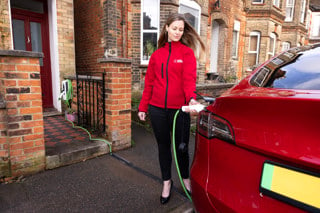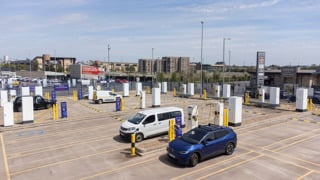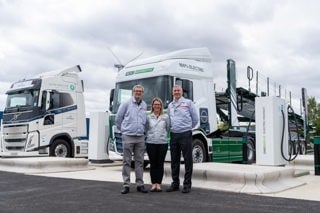The Association of Fleet Professionals (AFP) and Charge UK have set out their views on the next steps for the Government’s £400 million charging investment in the coming months.
Chancellor Rachel Reeve’s Spending Review in June allocated £400m to support the rollout of charging infrastructure, building on the over 82,000 public charging devices already available.
The following weeks saw the confirmation of a fizzling out of the Conservative’s £950m Rapid Charging Fund (RCF), which never took off after it was announced by then Chancellor Rishi Sunak back in 2020.
Charge UK said that the RCF was never actually scrapped, because it never really exited its trial phase.
The RCF was supposed to support motorway service area operators (MSOs), to help cover the cost of upgrading or installing the necessary grid connections at their sites.
Once the grid capacity was in place, individual charge point operators (CPOs) could then bid for contracts to operate charge points on those sites through separate commercial agreements.
Ultimately, the RCF never moved beyond its trial phase and so no full-scale disbursement to MSOs ever took place.
It is not yet fully clear how the full £400m that has now been allocated will be spent, but the Government has committed £25m to install cross-pavement technology that enables cables to run safely beneath pavements and allow roadside charging from a domestic energy source.
A further £30m will help fleets develop depot charging facilities and £8m will be used to power electric ambulances and medical fleets across more than 200 NHS sites.
Other suggestions for the £400m include lowering standing charges, equalising VAT on charging and further refocusing the strategy towards improving on-street charging provision.
Charge UK said rapid and ultra-rapid charging provision has increased by 33% year-on-year to 16,259 devices as of the end of May 2025.
Depot charging and capacity at rapids
Paul Hollick, AFP chair, told Fleet News that it would largely support the refocus towards on street charging, noting that the volume of rapid chargers on the Strategic Road Network (SRN) is moving in the right direction, but a question around capacity remains.
He said: “You can be in an EV capable of receiving 350kwh, but may only top out at 50kwh because there are other EVs charging too, which can bring overall speeds down.
“This is an uptime issue that needs addressing for the future.”
The other major area the AFP would like to see investment is towards depot charging projects.
Hollick said: “The cost of the civil works required to put depot charging in place is cost prohibitive.
“We have members that are quoted millions just for the civil works alone.”
The AFP has mapped out where charging provision is needed for its members as part of its EV kerbside charging data project.
Key findings include that nearly four out of 10 homes (38.7%) are without off-road space that would enable chargers to be fitted for an electric panel van. Overall, 65-70% of AFP van drivers need kerbside charging installed.
Hollick also said that as the Government moves forward with its £400m investment, it needs to look at cutting red tape and reducing the time and complexity of moving forward with projects.
The Government has clearly been listening to industry concerns, because Cenex and the Energy Saving Trust have been chosen to deliver the UK Government’s new depot charging scheme, which will offer fleets up to 75% off the cost of charging infrastructure.
The £30m fund, which was announced on Sunday (July 13), is expected to support the installation of more than 3,000 van and 200 HGV charge points.
Funded by the Department for Transport (DfT) and administered by the Government Grants Management Service (GGMS), the scheme will provide targeted financial support to assist businesses and local authorities in installing the necessary infrastructure for charging zero-emission heavy goods vehicles (HGVs), vans, and coaches.
Grid connection projects need to be accelerated
Funding is welcome, but there have still been delays with getting projects moving quickly enough.
Hollick explained: “Everything on infrastructure is just much too slow. Fleets can’t afford to wait a year and a half for lengthy approvals.”
Vicky Read, ChargeUK chief executive, agreed that while public charge points have increased by 37% in 2024 alone, barriers to deployment “must be removed and grid connections need to be accelerated”.
Another criticism of the UK’s charging infrastructure rollout has been the disproportionate allocation of investment in areas like London and the southeast.
This has caused a “post code lottery” for other areas of the UK, which needs addressing to make sure charging provision is equally available for all drivers, wherever they may be located.
Read said: “A combination of factors is needed to ensure rollout for private investment is as commercially viable as possible including – tackling high energy costs, stable regulation and removing local level barriers to charge point deployment, with subsidy targeted at where most needed and working in harmony with private investment.”
All Levi funding has been allocated
The Public Accounts Committee (PAC) found earlier this year that the Government had been slow to address gaps in charge point provision.
The PAC also highlighted delays in the Local Electric Vehicle Infrastructure (Levi) programme designed to support local authorities in England to install charge points where they are most needed.
Only 10 out of 78 installation projects had been approved for delivery as of October 2024, against a March 2025 deadline.
Charge UK confirmed that all money for Levi has now gone to local authorities and they are in the process of designing procurements, which need to be approved by Office for Zero Emission Vehicles (OZEV).
This OZEV approval process needs to happen before CPOs can bid to win contracts.
Read said: “These are complex procurements, which take time and need to meet Government’s criteria, but they are now coming to market.”
Brighton and Hove City Council is one of the projects that has just got the greenlight for Levi funding with 1,800 lamppost charging points to be installed over the next three years in partnership with Chargy.
The project is putting £2.8m from the Levi into action.
The council is working on a long-term 15 year project to install 6,000 lamppost charge points in total with Chargy, as well as 1,000 fast charge points between 8kW and 50kW, 200 rapid and ultra rapid charge points and two ultra rapid EV hubs.
Charge UK is now working on next steps in collaboration with the Government over the £400m funding allocation.
Read added: “As part of our ongoing engagement with policymakers, Charge UK will work closely with the Government to ensure this funding is used in ways that deliver the best outcomes for drivers and support the continued expansion of the charging network.
“Funding of this size is hugely beneficial to expanding the rollout, with many projects and initiatives across the sector that could benefit.”






















Login to comment
Comments
No comments have been made yet.